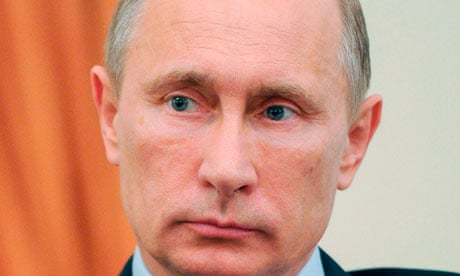Russia's president, Vladimir Putin, has signed into law a measure that stigmatises gay people and bans giving children any information about homosexuality.
The lower house of Russia's parliament unanimously passed the Kremlin-backed bill on 11 June and the upper house approved it last week.
The Kremlin announced on Sunday that Putin had signed the legislation into law.
The ban on "propaganda of nontraditional sexual relations" is part of an effort to promote traditional Russian values over western liberalism, which the Kremlin and the Russian orthodox church see as corrupting Russian youth and contributing to the protests against Putin's rule.
Hefty fines can now be imposed on those who provide information about the lesbian, gay, bisexual and transgender community to minors or hold gay pride rallies.
